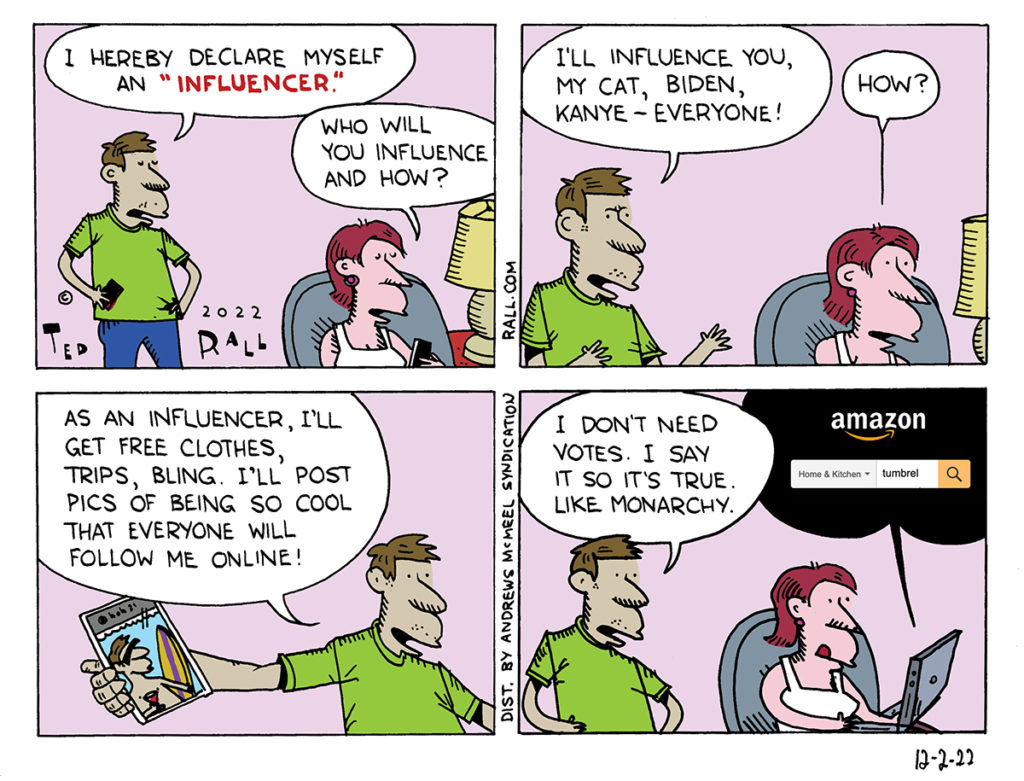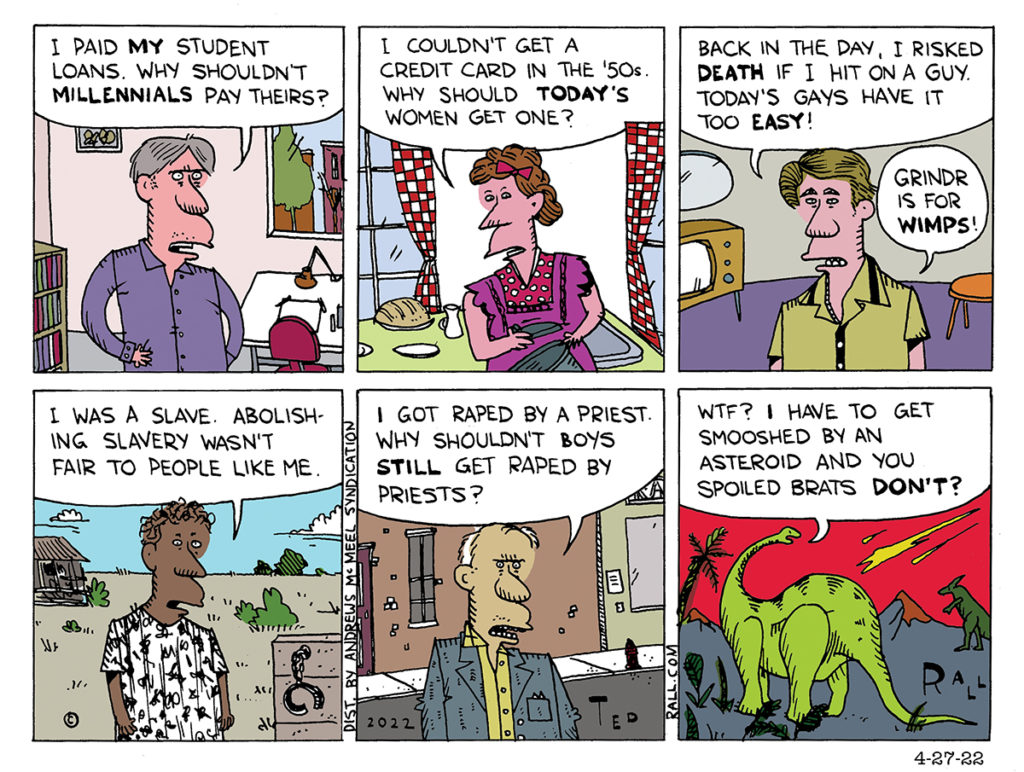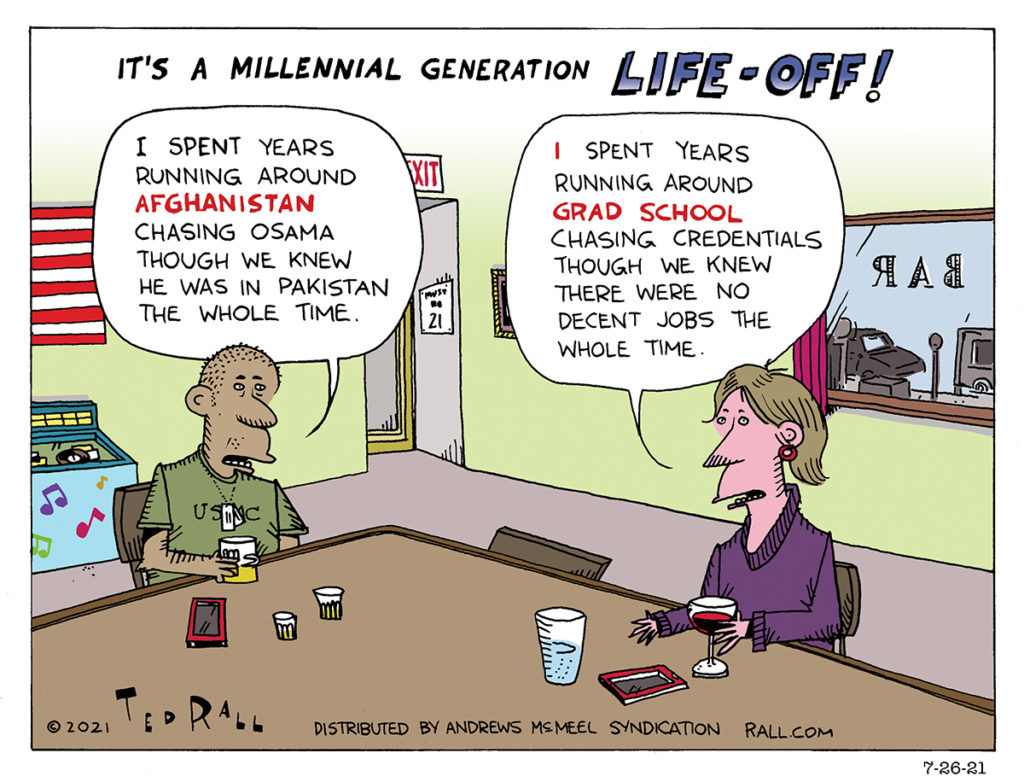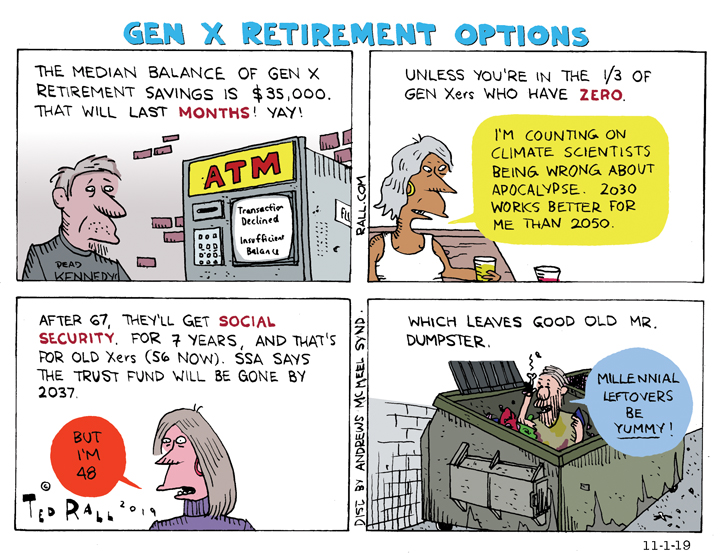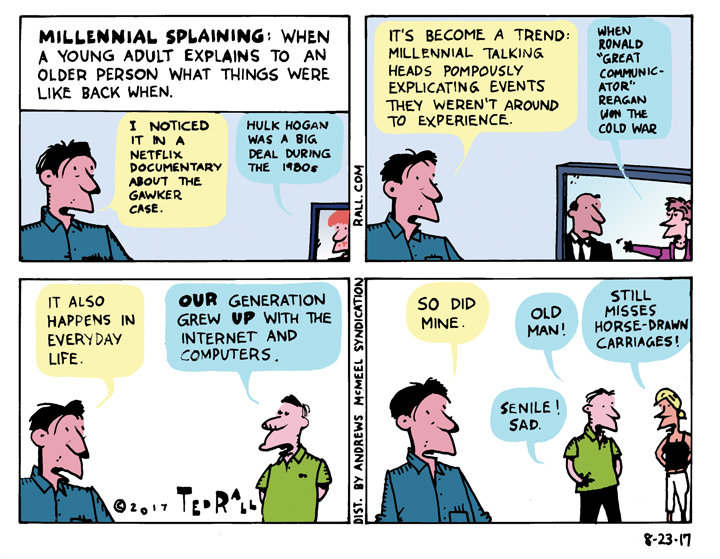I live in New York City, where many homeless people rely on panhandling in order to get by. A few days ago I saw a Millennial woman turn down a request from a homeless man, saying, “I don’t carry cash.” I have long been concerned about the ramifications of our increasingly cashless society, like the ability of the government to lock down our bank accounts and ability to move freely. As usual, the poorest among us are paying the biggest price for what we’ve been told is progress.
It’s a Millennial Generation Life off!
Trillions of dollars have been spent. Thousands of American soldiers have been killed. Yet the United States is right back where it started in Afghanistan 20 years ago, with the Taliban advancing so rapidly that military experts believe they will soon control the entire country again. Some veterans are asking aloud, was the war worth the cost? Clearly not. The war was a mistake from day one. After all, Osama bin Laden was in Pakistan the entire time, not Afghanistan. And the 9/11 plot was hatched in Pakistan and probably funded by Saudi Arabia. We never should have been there.
Generation X Retirement Options
Members of Generation X have almost no retirement savings whatsoever. They don’t have defined benefit retirement packages. 401(k) savings programs are a joke. If they’re counting on Social Security, forget it. Political pressure to get rid of the program will certainly screw them before they get to collect it. And anyway, Social Security itself claims that it will be bankrupt in less than 20 years.
Generation X Faces a Bleak, Impoverished Old Age

In 1991 the demographers Neil Howe and William Strauss published their awkwardly-titled tome “13th Gen,” about Generation X—the Americans born between 1961 and 1981. If Xers had paid attention they would have committed suicide.
“Child poverty, employment, wages, home ownership, arrest records — in every category, this generation, the 13th since the American Revolution, is doing worse than the generation that came before,” New York Times book critic Andrew Leonard wrote at the time. “Indeed, for the first time since the Civil War, the authors of ‘13th Gen’ keep reminding us, young people are unlikely to surpass the affluence of their parents.”
Tellingly, the Times titled Leonard’s review “The Boomers’ Babies” as though their relationship to The Only Generation That Mattered at the time was their status as offspring. Which, equally tellingly, was incorrect. Most Xers’ parents belong to the Silent Generation that came of age in the 1940s and 1950s, not the Boom.
As Gen Xers passed through each stage of life, Mssrs. Howe and Strauss predicted, they would find themselves living through the worst possible time to be whatever age they happened to be. They attended secondary schools turned threadbare by budget cuts. As they entered young adulthood the government restored draft registration and abolished financial aid grants for college. When “13th Gen”came out the oldest Xers were in their late 20s, in the middle of a deep recession that decimated their job prospects and made it impossible for them to pay off their student loans or save for retirement.
The trend continued. The oldest Xers are in their late 50s but 47% have nothing saved for retirement; only 13% have more than $100,000.
Though frequently mocked by corporate journalists, Howe and Strauss have proven prescient, not least because they coined the word “Millennials.” If anything, demographic fate has become even unkinder to Gen X, now ages 36 to 56. Under “normal” circumstances, these Americans would be dominating businesses and cultural institutions.
Instead, political power and cultural influence have neatly leapfrogged from the ubiquitous Baby Boomers to their actual children, the Millennials.
Silicon Valley is one barometer. Tech is the nation’s most dynamic sector. The Valley wields influence disproportionate to its quarter of a million employees. Tech is militantly, brutally, cartoon-villainously ageist. People over 35–the “olds,” Millennials call us—need not apply.
Five years ago, I wrote: “The median American worker is age 42. The median age at Facebook, Google, AOL and Zynga, on the other hand, is 30 or younger. Twitter, which recently got hosed in an age discrimination lawsuit, has a median age of 28.” Silicon Valley hasn’t done anything to reverse this dismal record.
Google just settled another age discrimination lawsuit. But they haven’t learned anything.
Brazen ageism sticks out even more in a PC culture where discrimination against women, ethnic minorities, LGBTQA people and others prompts horror, as it should. Young people who don’t tolerate ethnic slurs call older folks slow, out-of-touch and stupid—remarks all the more baseless since they increasingly segregate themselves into dorm-like apartment complexes and hipster bars where they don’t encounter anyone older than 40.
“Google in 2014 began publishing diversity statistics and vowed to hire more women, minorities, and LGBTQ workers. But Google didn’t include diversity statistics for age in its diversity report, or even reference age. Incredibly, age remains invisible in Google’s 2019 diversity report,” marvels employment discrimination attorney Patricia Barnes.
Meanwhile, coverage of generational issues in mainstream media has deteriorated beyond the Howe-Strauss model of consistent discrimination to downright Orwellian: being “disappeared.” In articles and broadcasts conflicts between age groups lists the combatants as Boomers versus Millennials, or more broadly, between Boomers and Millennials and the generation after, Generation Z. Generation Xers aren’t mentioned. They—we—no longer exist. Which, considering why Gen Z is called that—first came X, Millennials were Y, then Z—is really weird.
True to “13th Gen” the book, America’s invisible generation is heading into its final chapter, old age, at yet another awful time to be that age.
The Boomers will shuffle off into the sunset, Social Security and Medicare benefits intact. Gen Xers stare into the abyss, bleakly contemplating starvation and dying of diseases for which they can’t afford medical treatment as the political system moves closer to granting corporate conservatives one of the dearest items on their agenda: abolishing or privatizing—which, if you’re poor, is jargon for eliminating—Social Security.
“Out With the Old, In With the Young,” an opinion essay by 40-year-old Gen Astra Taylor in the New York Times, provides a glimpse at how the ruling classes plan to take away government entitlement programs from Generation X: by disempowering them politically.
Taylor makes some good points. “From age limits on voting and eligibility for office, to the way House districts are drawn, to the problem of money in politics, our modern political system is stacked against the young,” she writes. Unlike adults, teenagers are forced to learn about the politics and history in school. They should be allowed to vote. Why should someone be able to drive, vote and join the military at age 18 but have to be 30 or older to serve in the Senate?
But Taylor’s piece is riddled with ageist assumptions such as the notion that younger people care more about climate change than older ones. She promulgates the disappearing of Generation X: “The boomers who came of age in the 1950s and ’60s benefited from boom times while Millennials and Generation Z have been dogged by the aftermath of the mortgage meltdown, an underwhelming recovery and Gilded Age levels of inequality.” “Generation X” does not appear in her piece—yet we’re the post-Boomers who got screwed first.
“Age-based inequities “and “the geographic biases of the American electoral system,” Taylor complains, hasten “the coming gerontocracy.” What she fails to see is that the gerontocracy is already here. The “olds” control power over big business and its pet politicians now—not because they’re elderly but because they’re Boomers.
The fortunes of an age group ebb and flow as different generations pass through it. When I was a kid in the 1970s, many older people were so poor they ate pet food. Now they are Boomers. Boomers are many, so they have power, thus they are rich. As throughout human history, the rich and powerful make things work for themselves.
The corollary is, Taylor doesn’t understand that as Boomers die and Xers replace them in nursing homes—or not, since they won’t be able to afford them—the elderly will become a dispossessed, disadvantaged, consistently screwed-over age group, just as Xers were as kids, young adults and during middle age. Taylor and her Millennial allies will be killing a gerontocracy that will already be dead.
As Millennials ascend and age into their 40s, they’ll join the call to get rid of Social Security, Medicare and Medicaid so they can save on their taxes. Propaganda like Taylor’s will support the movement to disenfranchise the elderly.
Used to be, the olds voted in vast numbers to protect their political interests. Xers will be wandering the streets, dumpster-diving and dying a dog’s death, with no address to enter on a voter registration card.
(Ted Rall (Twitter: @tedrall), the political cartoonist, columnist and graphic novelist, is the author of “Francis: The People’s Pope.” You can support Ted’s hard-hitting political cartoons and columns and see his work first by sponsoring his work on Patreon.)
SYNDICATED COLUMN: Who Will Do Something About the Looming Retirement Crisis?
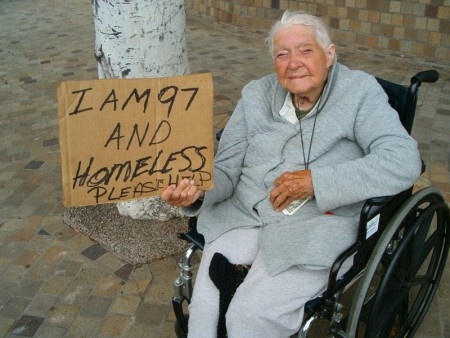
In Douglas Coupland’s 1991 age-warfare classic novel “Generation X” a young man trashes a car because it bears a bumpersticker with the obnoxious slogan “I’m spending my children’s inheritance.” Like Coupland I launched my career as something like a spokesperson for Generation X, raging on behalf of a demographic cohort perpetually struggling to make itself and its concerns heard in the wake of the older, bigger and wealthier Baby Boom generation. Culturally marginalized by the Boomers, forced to accept transient employment, hobbled by growing student loan debt and buffeted by recessions, Xers feared that they would never be able to save enough in order to retire, much less spend their kids’ inheritance.
The retirement crisis will be worse than we ever feared.
“We predict the U.S. will soon be facing rates of elder poverty unseen since the Great Depression,” New School economist Teresa Ghilarducci and Blackstone executive vice chairman Tony James write in the Harvard Business Review.
Sayonara, Kurt Cobain. Born in 1961, the oldest Xers are graying, aching, 57. And in trouble. A New School study projects that 40% of workers ages 50-60 and their spouses who are not poor or near poor will fall into poverty or near poverty after they retire.
Retirement specialists from the political left and right concur: big segments of whole generations of the elderly will soon be impoverished, some homeless or even starving. After the Xers, the Millennial deluge; old age looks even bleaker for today’s young adults.
Experts vary on how much you should have saved by the time you retire. Fidelity advises a $75,000-a-year worker who retires at age 67 to squirrel away at least $600,000 in present-day dollars. Following the traditional rule of having 80% of your salary for 20 years pushes that desired minimum to $1.2 million.
The problem is, the average savings of 55- to 64-year-olds is a piddling $104,000. According to a 2015 study of people 55 and older by the General Accounting Office, 29% have nothing whatsover.
It’s a joke, but it’s not funny. Yet neither political party has much to say about the looming retirement crisis.
The rapidity and scale of downward mobility among the elderly will shock American society, precipitating political upheavals as dramatic as those we saw during the 1930s. Political and business leaders are in denial about this issue. But the desperation of our grandparents and parents — not to mention the children charged with caring for them since they won’t be able to provide for themselves —will make voters vulnerable to demagoguery of all stripes. Instability will be rampant. Democracy could be in danger.
It isn’t hard to see how we got here.
Old-fashioned defined-benefit pension plans have been replaced by defined-contribution benefit plans like IRAs and 401(k)s which are problematic for many workers. People don’t contribute enough. Employers pitch in less than they did to pensions, or nothing at all. When workers suffer a setback like a job loss, they borrow against their accounts. They make poor investment decisions. When the stock market suffers a downturn, accounts lose value. High administrative costs suck away returns. The average 401(k) has never been bigger — but still, we’re talking total savings of $104,000.
Try living on that for 20 or 30 years.
Baby Boomers enjoyed the last vestige of an economy where you might hold one or two jobs throughout your most of your working career. They grew up in two-parent households and enjoyed the fruits of the postwar boom.
By contrast, many Generation Xers and younger Millennials have divorced parents, which reduced their financial security. Gen Xers got slammed by the 1987 stock market crash as well as the 2000 dot-com collapse; both Xers and Millennials lost jobs and savings during the 2008-09 Great Recession. They work in the gig economy. Younger workers might not have to drive for Uber or rent out a room on Airbnb but their work lives are highly mobile and frequently disrupted. They get laid off and outsourced. They must go back to school or move to adjust to employers’ demands. Their real and net incomes are significantly lower than the Boomers’ and their savings rate reflects that.
Paying average monthly benefits of just over $1300, Social Security is a supplementary, not a primary retirement plan. Even if they’re content to live modestly, cash-poor Xers have a gaping wound for which Social Security is a Band-Aid.
Although many older people enjoy working, too many cannot. A record 19% of Americans over age 65 currently work at least part-time; of course, that means that 81% do not. Older people are prone to failing health. And it’s hard to find someone to hire them.
The older you are, the more likely you are to fall prey to age discrimination. Companies are also motivated by simple economics, cutting costs by firing older workers and replacing them with younger ones.
Hillary Clinton ignored the distress of downsized working-class whites in flyover country to her own, and her party’s peril. Donald Trump won his surprise victory partly because he acknowledged the rage of Rust Belters long neglected by both parties. The outcome might have been different had Democrats maintained their traditional 20th century focus on labor and the Midwest by promoting job-retraining programs and other attempts to get industrial workers back on their feet.
Now we’re looking at a problem as big as deindustrialization. If one of the two major parties is able to get ahead of the coming retirement crisis by putting forth some meaningful solutions now, before dystopia arrives, they will reap the benefits at the polls. Conservatives may want to support GRAs (Guaranteed Retirement Accounts) in which workers are required to withhold a portion of each paycheck in order to invest for their retirement. Liberals may prefer shoring up the Social Security system in order to increase monthly payouts.
Or we can do nothing as we marvel at the sight of our grandparents fighting over Dumpster scraps.
(Ted Rall (Twitter: @tedrall), the political cartoonist, columnist and graphic novelist, is the author of “Francis: The People’s Pope.” You can support Ted’s hard-hitting political cartoons and columns and see his work first by sponsoring his work on Patreon.)
SYNDICATED COLUMN: Are Millennials the Most Ageist Generation Ever?

Ever notice how those who complain about being victims are themselves at least as likely to be perpetrators of the same offense? Examples that come to mind for me include the United States and Israel, two countries that portray themselves as targets of terrorism while carrying out wars of aggression whose death tolls far exceed their own losses. You’ll no doubt think of your own examples.
We’re seeing this projection at work with Millennial ageism. The Millennial generation is the most ageist in memory, yet the online media outlets they dominate discuss a problem that, if it really exists, pales in comparison: ageism against Millennials. But, like American presidents’ assertions that the United States has to protect itself against the world when, if anything, it’s really the world that needs to protect itself against the United States, it’s a joke.
Millennials’ status as members of the biggest generation in history – numbering more than 83 million, they have officially beaten the Baby Boomers – ensures that they will have a lot of power over American politics and the workplace, especially as they get older.
Which, if current experience serves to predict the future, they will abuse.
As I have written, ageism – the old-fashioned kind, by the young against the old – is endemic to Silicon Valley, the highest profile business sector controlled by people in their 20s and low 30s. Moreover, it’s normative: everyone thinks it’s OK. So OK do they think it is that national business magazines even publish articles saying it’s “smart” not to hire older Americans because they’re “dumber.”
I call it the old-fashioned kind of ageism because young-picking-on-old discrimination hasn’t been a thing since the “youth culture” of the 1960s and 1970s. Back in their hippie days, Baby Boomers in their 20s were so mean to their elders that they even made a movie whose plot involved putting people over 30 into concentration camps. As they got older, Baby Boomers flipped the switch, deploying their power as employers to discriminate against Generation Xers. Now that the Boomers are finally fading into the demographic mists, their Millennial children are beginning to repeat that half-century-old pattern, marginalizing and refusing to hire Gen Xers.
Ah, the great psycho of life.
While thinking about and researching this essay, I turned my critical eye to myself and my Gen X contemporaries. When we were in our 20s, didn’t we look down on older people? When we got a chance to hire and fire, didn’t we discriminate against those we viewed as boring and out of touch?
Not really.
Sure, we had more in common with members of our own age cohort than those older than us. But we didn’t look down on older folks…though many of them made fun of us (if they noticed us at all) and would rather let a job go unfilled than hire us.
I remember, for example, working as a staff writer for P.O.V. magazine. Almost all of us were in our 20s and 30s — not because management rejected older writers, but because older writers already had jobs elsewhere. But when editor Randall Lane brought on legendary sportwriter-barfly Bert Sugar as a columnist, not only did no one hold his age against him – he was pushing 60 and looked closer to 80 – everyone thought it was cool to add him to the team. Not just because he was “old school,” which we all admired, or despite his age, but because we appreciated the value that comes with experience. He had stuff to teach us; we wanted to learn, and hoped that some of that glory might rub off on us.
Compare that to the unceremonious departure of Mark “Copyranter” Duffy, 53, from BuzzFeed. Dude was the smartest man in the office; they fired him for being old.
I’ve never been into her music, but the cruel reception of Millennial-dominated media outlets to Madonna’s insistence on continuing to use sex to market herself at age 56 has me admiring her spunk (and, actually, finding her physically hotter than she was back in the 1980s). Also, I have to contrast the viciousness to the way that we Gen Xers treated older pop and musical figures at the same age.
As a record reviewer in my late 20s and early 30s, I can’t recall a single instance of an older rock or pop musician or group being dissed simply because he or she was old. If you sucked, you sucked. If you were good, you were good. If anything, our default mode was to tend to respect anyone who had stuck around for a while. We didn’t exactly respect our elders — as Gen Xers, we didn’t respect anyone, not even ourselves – but we didn’t disrespect them either. For us, it made perfect sense that punk rockers like The Clash admired old glam guys like Ian Hunter of Mott the Hoople.
That “rather die before I get old” crap was from the 1960s, not us.
The tendency of Millennials to denigrate their Gen X and Boomer elders is probably hardwired into the demographic reality of belonging to a big, dominant generation. One of the ways you feel good about yourselves is by picking on smaller, weaker groups. No matter what I or anyone else writes, even if every Millennial in the world reads it, there’s virtually no chance it will reduce their ageist tendencies.
Still, it’s sad. I think about my former literary agent and friend Toni Mendez, who died 12 years ago —at work — at the age of 95. She was more vibrant and interesting and outrageous and intelligent than a thousand typical 25-year-olds combined, and I still miss her terribly. Those 30-year-old gatekeepers in Silicon Valley and elsewhere who think that everyone over 35 has nothing to contribute are screwing themselves too, and leaving money on the table.
(Ted Rall, syndicated writer and the cartoonist for The Los Angeles Times, is the author of the upcoming book “Snowden,” the first biography of NSA whistleblower Edward J. Snowden. It is in graphic novel form. You can subscribe to Ted Rall at Beacon.)
COPYRIGHT 2015 TED RALL, DISTRIBUTED BY CREATORS.COM


